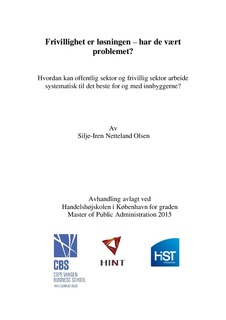Frivillighet er løsningen - har de vært problemet? : hvordan kan offentlig sektor og frivillig sektor arbeide systematisk til det beste for og med innbyggerne?
Master thesis
Permanent lenke
http://hdl.handle.net/11250/284267Utgivelsesdato
2015-05-29Metadata
Vis full innførselSamlinger
Sammendrag
In Norway and Denmark, voluntariness has a long tradition. In Norway, we had a very active
voluntary sector until after World War II. During the postwar years, Norway developed a very
robust welfare state. In this welfare state, the philosophy was that it should be the state taking
care of the citizens, while the voluntariness became a more abstract role in the society.
Now we see that the welfare state has trouble meeting the challenges between needs, wants
and resources, and the state need to think of new ways to solve some of the challenges in our
society. In Denmark, they have come a long way to specify the new type of focus in society,
with specific plans and methods so that both employees and the people volunteering can work
together. In Norway, we have many reports and documents stating the importance of public
sector collaborating with the sector of volunteers, but we have little if anything specific on
how to achieve this.
The aim of this thesis is to investigate how the public and voluntary sector systematically can
work together to the best of the society. To answer this question, I have analyzed documents
used in Norway and Denmark. On two occasions, I have observed meetings where voluntary
sector was the main topic of discussion. The third method of collecting empirical data came
through interviewing eight people who in different ways gave an insight into the questions
asked in this thesis.
In addition to the main question, I have three research questions. In one question, I ask if the
leaders in public sector have a special responsibility to make sure the collaboration between
them and volunteers runs as smooth as possible. This question has at least to answers. If we
answer the question within the frame of New Public Management, the answer is yes. If we ask
the same question within the frame of governance, the answer is not so clear. In the second
question, I ask if we can lead volunteers the same way we would lead employees. If you want
to succeed in this task, as a leader you must acknowledge that it is two different spheres that
needs to be treated differently. In the third question, I asks if we are truly ready for this
change in society, where we all must participate in a more active way than we have done in a
long time. With the right frame and the right incentive, I think it is possible, but it will
demand a lot from all of us.
